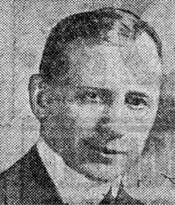Norman Winslow Cabot (July 1, 1876 – April 12, 1928) was an American football player.
 | |
| Harvard Crimson | |
|---|---|
| Position | End |
| Personal information | |
| Born: | July 1, 1876 Brookline, Massachusetts |
| Died: | April 12, 1928 Brookline, Massachusetts |
| Career history | |
| College | Harvard (1894–1897) |
| Career highlights and awards | |
| |
Cabot was born in 1876 in Brookline, Massachusetts.[1] He was the son of architect Edward Clarke Cabot, a descendant of explorer John Cabot.[2][3] He attended Hale School in Boston.[4]
He attended Harvard University where he played for the Harvard Crimson football team from 1894 to 1897. He was 5', 11-1/2" and 168 pounds and was called "a remarkably strong tackler and a good ground-gainer."[5] As a sophomore, he was selected as a first-team end on the 1895 All-America college football team.[6] He was also elected captain of the 1897 Harvard football team.[7]
After leaving Harvard, Cabot and his brother formed the real estate firm of Cabot, Cabot & Forbes in Boston. During World War I, he served as an ensign in the United States Naval Reserve Force. He was stationed at the Moutchic air station in France. He later became commanding officer at the Tudy Island Naval Air Station before being reassigned to naval headquarters in Paris and later to the office of naval intelligence in London. He died in 1928 at his home in Brookline.[1]
References
edit- ^ a b "Norman W. Cabot, Realty Man, Dead". The Boston Globe. April 13, 1928. p. 16 – via Newspapers.com.
- ^ "Clubs and Clubmen". The Philadelphia Inquirer. February 22, 1914.
- ^ "Will Sigh For Tree Fight". The Boston Globe. June 18, 1898. p. 23 – via Newspapers.com.
- ^ Harvard College Class of 1898 Quindecennial Report. Harvard University. 1913. p. 51.
- ^ "All Ready for the Big Game". The Philadelphia Times. November 20, 1897. p. 8 – via Newspapers.com.
- ^ "Football Award Winners" (PDF). National Collegiate Athletic Association (NCAA). 2016. p. 6. Retrieved October 21, 2017.
- ^ "Cabot Chosen Harvard's Captain". Springfield Republican. November 23, 1896.